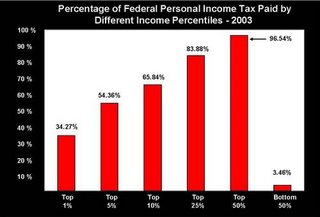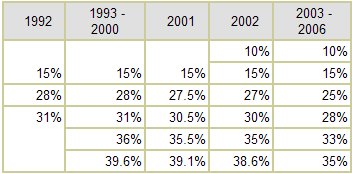31 May 2006
28 May 2006
Brain Food
Posted By:
Unknown
at
23:32
1 reader insights
![]()
Labels: cool links
If it wasn't for those darn kids!
A new way to tell if kids are underage...? How about giving one set of differing instructions in the high tone and see who heeds them.
Posted By:
Unknown
at
16:19
0
reader insights
![]()
Labels: science
26 May 2006
Blogger's Block: Revert to Reading
Batman: The Dark Knight Returns -- Batman comes out of a 10 year retirement to save Gotham City. A refreshing new look at Batman, though the 13-year old girl as Robin is a little weird, as is the fight between Batman and Superman, though the context of the fight is interesting.
Atlas Shrugged -- Possibly the best book I have ever read. It is a stirring call for freedom and reason. Masterfully written, but incredibly long (1000+ pages).
V for Vendetta -- I read this because I saw the movie. I'm kind of obsessed with the whole communist/facist regime take-over story. Interesting, though I need to read it again to understand some of the interplay. A few of the characters look alike.
Anthem -- Another Ayn Rand title though this one is incredibly short at just 120 pages. Essentially a short version of an extreme version of 1984. I enjoyed it, only took a couple hours to read.
The Gunslinger, The Dark Tower 1 -- The only Steven King book I've read, at the suggestion of a friend. To be honest, I haven't finished it and if I hadn't bought it I would not bother. It's a future western mixed in with some dark magic.
Silent to the Bone -- Young adult fiction. I'll explain. My mom bought it for my sister but I was bored and decided to read it. Basically a kid witnesses his sister nearly die and he stops talking, to anybody. We find out he is ashamed of something that happened between him and his sicko au pair. The hints of pedophilia that run through the book made me a little uneasy and may be too mature for younger readers, but as a young teen reader exposure to its existence may have merit.
Lies my Teacher Told Me -- A look at how American History Textbooks white-wash history so as not to offend white students. Basically the author took a survey of 12 high school history textbooks and evaluated how they addressed controversial events and figures. It paints a more realistic picture of early american leaders and policy. All these type of books have some hidden agenda, so I don't give this one 100% credibility, but it introduces another interesting perspective on American History.
Posted By:
Unknown
at
20:54
0
reader insights
![]()
12 May 2006
11 May 2006
Tax stuff I didn't realize.

I thought the bottom 50% income earners paid more tax percentage. The bottom 50% cut-off is $29k.
This is also interesting,
I didn't know about the creation of the 10% bracket for under $7k earnings or the 2% reduction in earnings from $30-75k. I did hear about the tax cuts for the rich.
Posted By:
Unknown
at
22:30
0
reader insights
![]()
Labels: economics, Edumacation
Final Paper of Greatness
Here is my first paragraph:
Finding a Cozy Level of Causality in Engineering
Objective responsibility does not exist. Responsibility is a system of principles and judgments held by an individual or shared by a society, pertaining to whether actions are right or wrong. This system is applied to an objective measure, that is, the degree to which an individual’s actions cause another to occur, which I refer to as the degree of causation. The degree of causation sufficient to hold an individual responsible for an outcome differs among individuals or groups of like-minded individuals, rendering responsibility to the realm of subjectivity. So it does not make sense to speak of an engineer’s responsibility for the misuse of her innovations, only her degree of causation in a given misuse. Therefore, engineers are not at all responsible for the misuse of their innovations. Even so, engineers will attempt to find a comfortable degree of causation according to their individual preferences and pressures exerted by societies in which they interact. Furthermore, engineers will find it advantageous to understand the threshold degree of causation that other individuals and societies define as responsibility.
Update: To coincide with my submission, there is this (hat tip boing boing),
A farmer in Middlesex builds and exports gallows to African dictatorships, where they are used to execute dissidents and others who've been railroaded through corrupt judicial systems. He's been condemned by Amnesty International, but insists that "business is business," and some people deserve the death penalty. His business will be outlawed by a new EC regulation in July.Shall my paper hang from the gallows?
Posted By:
Unknown
at
20:11
1 reader insights
![]()
Buy American-- Buy Honda.
Statistics from the National Highway Traffic Safety Administration... show only 65% of the content of a Ford Mustang comes from the U.S. or Canada. Ford Motor Co. buys the rest of the Mustang's parts abroad. By contrast, the Sienna, sold by Japan's Toyota Motor Corp., is assembled in Indiana with 90% local components.My Honda is made with 70% U.S./Canadian Parts, the engine was made in the U.S.A. and the final Assembly point was in East Liberty, Ohio. The Big Three claim that they employ more Americans though,
"What's better for the American economy?" Mr. Doyle asks. A GM car "built in Mexico with 147,000 jobs back here in America or a Honda built in Alabama with 4,000 or 5,000 jobs in America?"A comment on the CafeHayek blog post puts it well
In that spirit, I'm going to open a hot dog stand and hire 500 people to work it. I'll be the most American company in the country. I'll be creating 500 American jobs!Will someone tell Lou Dobbs I'm available to be on his show anytime he needs a true American hero?
Posted By:
Unknown
at
19:40
0
reader insights
![]()
Labels: economics
Oprah is rich and likes it. *gasp*
and yes the link is from www.thesuperficial.com
"I have lots of things, like all these Manolo Blahniks. I have all that and I think it's great. I'm not one of those people like, 'Well, we must renounce ourselves.' No, I have a closet full of shoes and it's a good thing. I was coming back from Africa on one of my trips. I had taken one of my wealthy friends with me. She said, 'Don't you just feel guilty? Don't you just feel terrible?' I said, 'No, I don't. I do not know how me being destitute is going to help them.' Then I said when we got home, 'I'm going home to sleep on my Pratesi sheets right now and I'll feel good about it.' "
Posted By:
Unknown
at
18:12
0
reader insights
![]()
08 May 2006
The Living Wage: Part Ten point Seven Two
I thought, "wow, this is written for me!" Unfortunately, as I read, I discovered it was not for me nor was it for any other ECON folks as I define them. I was most pleasantly surprised to find the document was authored by some one I know!
This is for the ECON folks out there who doubt the living wage, in language they can understand: a refresher course of ECON 201, to go beyond elementary supply and demand.
Again, unfortunately, I get into these discussions when I am busy with other work, but I will have a post up soon where I discuss these Economic arguments point by point to see if I can lend some insight and perhaps give another perspective. Of course nothing I write is a personal affront to the author, who I actually respect a lot, and though I don't think I actually had to write that, just thought I would to avoid misunderstandings.
Update: Here is a draft that I penned up. It could use plenty of work, especially from you Econ junkies out there. Oh and I know about halfway through I lose my composure, but I'll try to clean that up, it happens when it gets late. You can email me with corrections or suggestions. I'm not trying to make it solely my reply, I just want it to be good.
Posted By:
Unknown
at
22:57
0
reader insights
![]()
Why 10%
Read more, here.
Very good question! Whenever you conduct financial analysis it is important to question whether you are using the right model and assumptions. You’re right, 10% seems to be the default annual return in finance textbooks and theoretical examples. Oddly enough, professors many years ago argued that was unreasonably high, then during the 90s many professors argued that it was too low. I guess your opinion depends on the context of your situation. So, let’s examine this assumption a little.
Posted By:
Unknown
at
09:46
0
reader insights
![]()
07 May 2006
New Blog: The Game of Life
From JC,
Everyone is a player in the game of real life. Let's analyze some specific aspects of this game.His first real post gives some interesting insight on the hidden costs of the living wage. (My previous post on the topic is here.)
Posted By:
Unknown
at
20:29
1 reader insights
![]()
World's Shortest Political Quiz

Posted By:
Unknown
at
19:39
1 reader insights
![]()
Labels: cool links, economics
02 May 2006
Shorter, more important post
Bryan Caplan says the Communists are comparable to Nazis. I tend to agree. Also his Museum of Communism is an enlightening way to spend an hour.
The basic premise is the Communists (Lenin, Stalin, and Mao) killed millions and million more than Hitler. We don't talk bad about Commies as much though because they had "good intentions." Caplan argues
In short, both ideologies began with the creepy demand that human beings stop being the diverse, self-interested animals that we are, and eagerly jumped to the conclusion that a bloodbath was in order.This is why I just have to shake my head at people who wear Che or Lenin shirts. They prop them up as revolutionaries, ignorant (or worse, not) to their brutal tactics. Another astute observation,
Perhaps the parallel is hard to see precisely because, even in the West, anti-capitalist propaganda has successfully dehumanized the bourgeoisie, landlords, money-lenders, and “the rich.” So when we hear Communists chant “Death to the bourgeoisie,” we don’t feel the same way we do when we hear Nazis chant “Death to the Jews.”
Posted By:
Unknown
at
02:58
0
reader insights
![]()
